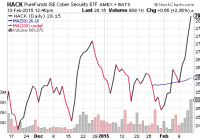Tag Archives: sweden
The Long Norway/Short Sweden Pairs Trade – Still Viable In Light Of Declining Markets?
Macro, currencies, arbitrage, statistical analysis “}); $$(‘#article_top_info .info_content div’)[0].insert({bottom: $(‘mover’)}); } $(‘article_top_info’).addClassName(test_version); } SeekingAlpha.Initializer.onDOMLoad(function(){ setEvents();}); Norway’s stock market has come under short-term pressure owing to growth concerns arising from lower oil prices. I still maintain that Norway’s stock market is undervalued relative to Sweden’s. However, it could take longer than anticipated for the Norwegian market to reach fair value. On June 3 , I had published an article arguing that a possible pairs trading opportunity exists through taking a long position on the Norwegian stock market through the iShares MSCI Norway Capped ETF (BATS: ENOR ) and a short position on the Swedish stock index through the iShares MSCI Sweden Index Fund* (NYSEARCA: EWD ). However, for this month we have seen the Norway ETF decline by 3.35 percent from $25.02 to $24.18, while the Swedish ETF has also declined by 2.57 percent from $34.97 to $34.07. The drop in Swedish stock market performance was not surprising and in line with my initial expectations. I had previously anticipated that lower than expected growth could translate to lower stock market returns as a result, and this has been the case for the month of June; with the consumer confidence indicator falling to 97.9 this month from a previous 99.0 in May. However, the decline in Norwegian stock market activity was less anticipated. Firstly, it appears that the Norwegian economy as a whole is still sensitive to oil price fluctuations, as the overnight deposit rate was cut to 1 percent this month as the effects of lower oil prices begin to take their toll on economic growth. Moreover, while lower wage growth remains a concern, house prices continue to rise in Norway which may give rise to speculation of a credit bubble similar to that of Sweden. For instance, it is anticipated that on the whole, Norwegian citizens now owe creditors twice as much as they make in disposable incomes. Additionally, house prices have increased by 7.5 percent in May from the previous year. In this regard, does the aforementioned pairs trading strategy still hold merit? It does if you have patience. Norway’s stock market remains undervalued on a P/E basis, and a major reason behind my bullish view on Norway was that various companies in the oil and financial sectors trade at lower than average P/E ratios while continuing to show impressive returns. However, it could take longer than anticipated for fair value to be reached as Norway grapples with short-term economic problems. In this context, this pairs trading strategy is best oriented over a longer-term horizon; i.e. 1 year or longer. *Note: The iShares MSCI Sweden Index Fund is not an inverse ETF and an investor would need to short-sell to take a short position in this instance. Disclosure: I/we have no positions in any stocks mentioned, and no plans to initiate any positions within the next 72 hours. (More…) I wrote this article myself, and it expresses my own opinions. I am not receiving compensation for it (other than from Seeking Alpha). I have no business relationship with any company whose stock is mentioned in this article. Share this article with a colleague
Currency Wars Offer Unique ETF Opportunities
The craziness in currency manipulation is occurring on every continent and in every region. So why are these devaluation endeavors happening on such a massive scale? Investors need to take these activities into account in the assessment of risk versus reward. David Bowie and Mick Jagger may believe that people are dancing on every street corner around the world. In actuality, however, they’re desperately competing with neighbors by devaluing their currencies. The craziness in currency manipulation is occurring on every continent and in every region. Japan’s brazen quantitative easing (QE) program has seen the battered yen hurt China’s export-dependent economy, leading to speculation that the People’s Bank of China (PBOC) may need to weaken its yuan. Europe’s recently launched QE program has decimated the euro at the expense of non-member nations. In response, Denmark and Sweden have put forward negative interest rates to keep the Danish krone and Swedish krona from rising against the euro. And in the Americas? Mexico, Peru, Chile and Venezuela have all come under fire from neighboring countries for rate cut activity that has depreciated their respective currencies. So why are these devaluation endeavors happening on such a massive scale? The most obvious reason is the belief that weaker currencies promote exports that will stimulate a nation or region’s economic well-being. In today’s battle, however, strong currencies also force import prices down and that can create deflation. All across the globe, the threat of deflation-based recessionary pressure has caused central banks to loosen monetary policy. Lowering rates to zero percent, “going negative,” buying assets with electronically-created credits (a.k.a. “quantitative easing”) all lead to lower currencies against rivals. Since every major central bank, and even the minor ones, are now engaged in unusual efforts to stimulate respective economies – since everyone is debasing paper money – investors need to take these activities into account in the assessment of risk versus reward. We know that the U.S. Federal Reserve succeeded in reflating the value of market-based securities as well real estate. Yet we also know that the world’s “strongest economy” is not quite as strong as advertised, and that the dollar’s surge against world rivals has already created exporter hardship domestically. For U.S. stocks, go with the momentum that mega-cap growth and Apple have been serving up. That might mean sticking with the stock uptrend via the Vanguard Mega-Cap Growth ETF (NYSEARCA: MGK ), until and unless it falls below and stays below a 200-day trendline. Also consider thematic/satellite holdings such as the PureFunds ISE Cyber Security ETF (NYSEARCA: HACK ). This exchange-traded tracker has been hitting “higher lows” ever since its recent introduction – a bullish technical sign to accompany the high profile concerns of “cyber-terrorism” and “identity theft.” On the flip side of the ledger, “risk-on” U.S. assets need some insurance against a policy mistake by the Fed (e.g.,raising rates too soon, failing to communicate intentions where credibility is lost, etc.). Not only did the trade deficit soar and consumer confidence drop dramatically in January, but corporate earnings and GDP guidance are both being revised downward. This means investors should buy the long treasury bond dips for protection, relative value and price gain potential . Consider buying a fund like the iShares 10-20 Treasury Bond ETF (NYSEARCA: TLH ) on this reversion to its 50-day MA. Finally, there’s reason to believe that, historically speaking, it makes sense to allocate a portion of one’s risk assets to places where valuations are lower than the U.S. It is true that European equities may struggle to make progress as long as the potential for an ugly divorce between Greece and the euro-zone exists. That said, if a path forward buys time for Greece and, by extension, Spain and Italy, export superstars in the euro-zone should profit immensely from the decimated regional currency. Many of my clients hold the iShares Currency Hedged MSCI Germany ETF (NYSEARCA: HEWG ) or the WisdomTree Europe Hedged Equity ETF (NYSEARCA: HEDJ ) to mitigate the fear of additional euro depreciation. Others might want the other side of that “bet” by picking up the iShares MSCI Germany ETF (NYSEARCA: EWG ). After all, the dollar could fall against the euro if the Fed pushes off interest rate hikes into 2016. Disclosure: Gary Gordon, MS, CFP is the president of Pacific Park Financial, Inc., a Registered Investment Adviser with the SEC. Gary Gordon, Pacific Park Financial, Inc, and/or its clients may hold positions in the ETFs, mutual funds, and/or any investment asset mentioned above. The commentary does not constitute individualized investment advice. The opinions offered herein are not personalized recommendations to buy, sell or hold securities. At times, issuers of exchange-traded products compensate Pacific Park Financial, Inc. or its subsidiaries for advertising at the ETF Expert web site. ETF Expert content is created independently of any advertising relationships.

